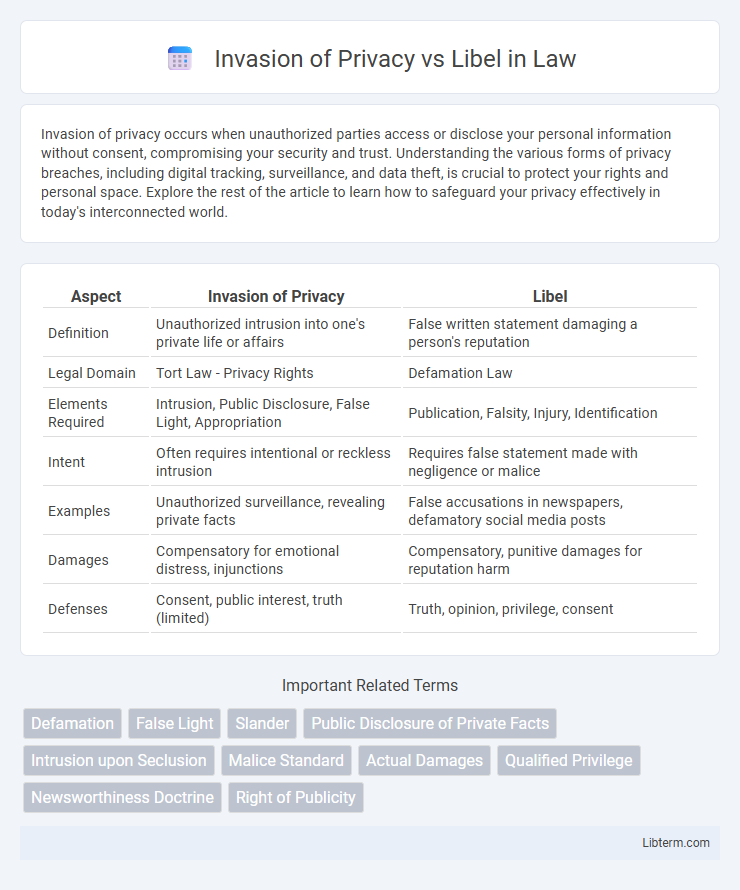Invasion of privacy occurs when unauthorized parties access or disclose your personal information without consent, compromising your security and trust. Understanding the various forms of privacy breaches, including digital tracking, surveillance, and data theft, is crucial to protect your rights and personal space. Explore the rest of the article to learn how to safeguard your privacy effectively in today's interconnected world.
Table of Comparison
| Aspect | Invasion of Privacy | Libel |
|---|---|---|
| Definition | Unauthorized intrusion into one's private life or affairs | False written statement damaging a person's reputation |
| Legal Domain | Tort Law - Privacy Rights | Defamation Law |
| Elements Required | Intrusion, Public Disclosure, False Light, Appropriation | Publication, Falsity, Injury, Identification |
| Intent | Often requires intentional or reckless intrusion | Requires false statement made with negligence or malice |
| Examples | Unauthorized surveillance, revealing private facts | False accusations in newspapers, defamatory social media posts |
| Damages | Compensatory for emotional distress, injunctions | Compensatory, punitive damages for reputation harm |
| Defenses | Consent, public interest, truth (limited) | Truth, opinion, privilege, consent |
Understanding Invasion of Privacy
Invasion of privacy involves the unauthorized intrusion into an individual's personal life without consent, often through actions like unauthorized surveillance, public disclosure of private facts, or false light portrayal. Unlike libel, which centers on false and damaging written statements, invasion of privacy protects individuals' rights to personal solitude. Legal protection against invasion of privacy requires proving that the intrusion would be highly offensive to a reasonable person and occurred in a context where there was a reasonable expectation of privacy.
Defining Libel in Legal Terms
Libel is legally defined as a false and defamatory statement made in a fixed medium, such as writing or published media, that damages another person's reputation. Unlike invasion of privacy, which involves unauthorized intrusion into a person's private life, libel specifically addresses harm caused by false statements presented as facts. Courts require proof that the statement is both untrue and injurious to the subject's reputation for a successful libel claim.
Key Differences: Privacy vs Libel
Invasion of privacy centers on unauthorized exploitation or disclosure of an individual's private information, harming their personal dignity or solitude. Libel involves publishing false and defamatory statements in written form that damage a person's reputation. The key difference lies in invasion of privacy protecting personal secrecy, while libel safeguards against reputational harm caused by false information.
Legal Standards for Proving Invasion of Privacy
Proving invasion of privacy requires showing an intentional intrusion into a person's private affairs that would be highly offensive to a reasonable person, often supported by evidence of unauthorized access or publication. Legal standards emphasize the expectation of privacy and whether the defendant's actions violated that expectation without consent. Unlike libel, which demands false statements harming reputation, invasion of privacy centers on the unlawful exposure of private information regardless of truth.
Elements Required to Establish Libel
Libel requires the publication of a false statement presented as fact that harms the reputation of an individual or entity, with fault amounting to negligence or actual malice. The plaintiff must prove that the statement was defamatory, false, and made to a third party without consent. Unlike invasion of privacy, which centers on unauthorized use or disclosure of private information, libel focuses on damaging falsehoods harming public perception.
Real-World Cases: Privacy Breaches vs Libel
Real-world cases illustrate significant differences between invasion of privacy and libel, with privacy breaches often involving unauthorized disclosure of personal information, such as in the high-profile 2014 Sony Pictures hack. Libel cases, exemplified by the landmark New York Times Co. v. Sullivan, center on defamatory false statements harming an individual's reputation. Courts assess invasion of privacy claims by examining the expectation of privacy and whether sensitive data was disclosed without consent, while libel focuses on proving the falsity and harmful intent of publicized statements.
Defenses Against Invasion of Privacy Claims
Defenses against invasion of privacy claims often include consent, where the plaintiff agreed to the alleged private disclosure, and the truth, which can negate claims if the information is accurate and lawfully obtained. Public interest or newsworthiness serves as a strong defense, allowing the publication of private facts when they concern public affairs or figures. Furthermore, absolute privileges, such as those protecting statements made in judicial or legislative proceedings, can also shield defendants from liability in invasion of privacy cases.
Common Defenses in Libel Lawsuits
Common defenses in libel lawsuits include truth, which serves as an absolute defense proving the statement's accuracy; opinion, protecting expressions that cannot be proven true or false; and privilege, which grants immunity for statements made in certain contexts like judicial or legislative proceedings. Consent is another defense, where the plaintiff agrees to the publication of the allegedly defamatory content. Understanding these defenses is crucial in distinguishing libel from invasion of privacy claims, as the latter focuses on unauthorized disclosure rather than false statements.
Impact on Reputation: Comparing Consequences
Invasion of privacy primarily damages a person's personal and emotional well-being by exposing private information without consent, often leading to distress and loss of trust. Libel directly harms an individual's or organization's reputation by spreading false statements that can result in public embarrassment, loss of professional opportunities, and legal consequences. The consequences of libel typically have a more significant and long-lasting effect on professional and social standing compared to invasion of privacy claims.
Protecting Yourself: Best Practices for Avoiding Legal Issues
Protecting yourself from legal issues related to invasion of privacy and libel involves understanding the distinctions between these torts and adhering to best practices. Always obtain explicit consent before sharing private information or images to avoid invasion of privacy claims, and verify the accuracy of statements to prevent libel accusations. Maintaining documented evidence of facts and permissions can serve as a crucial defense in legal disputes.
Invasion of Privacy Infographic

 libterm.com
libterm.com